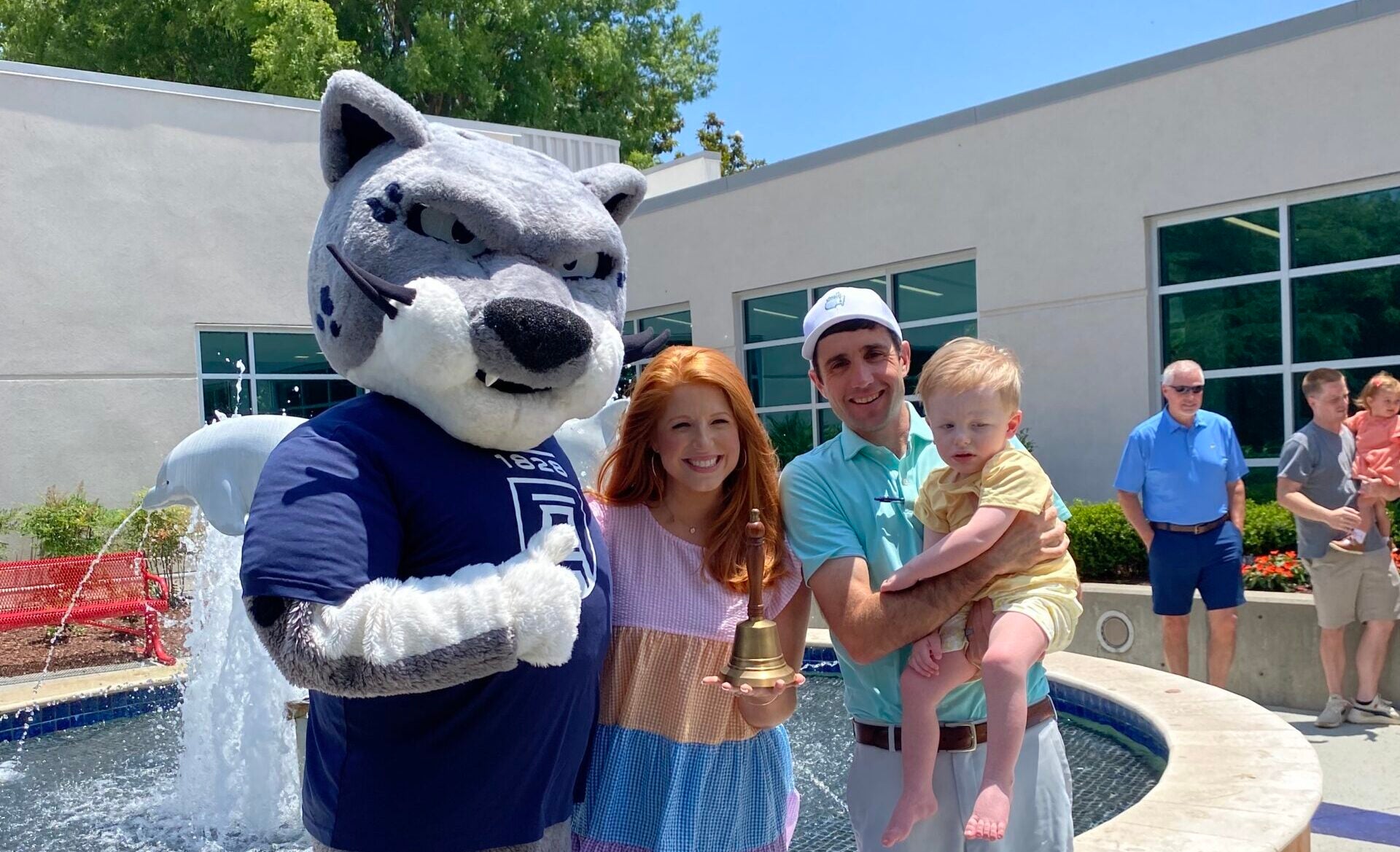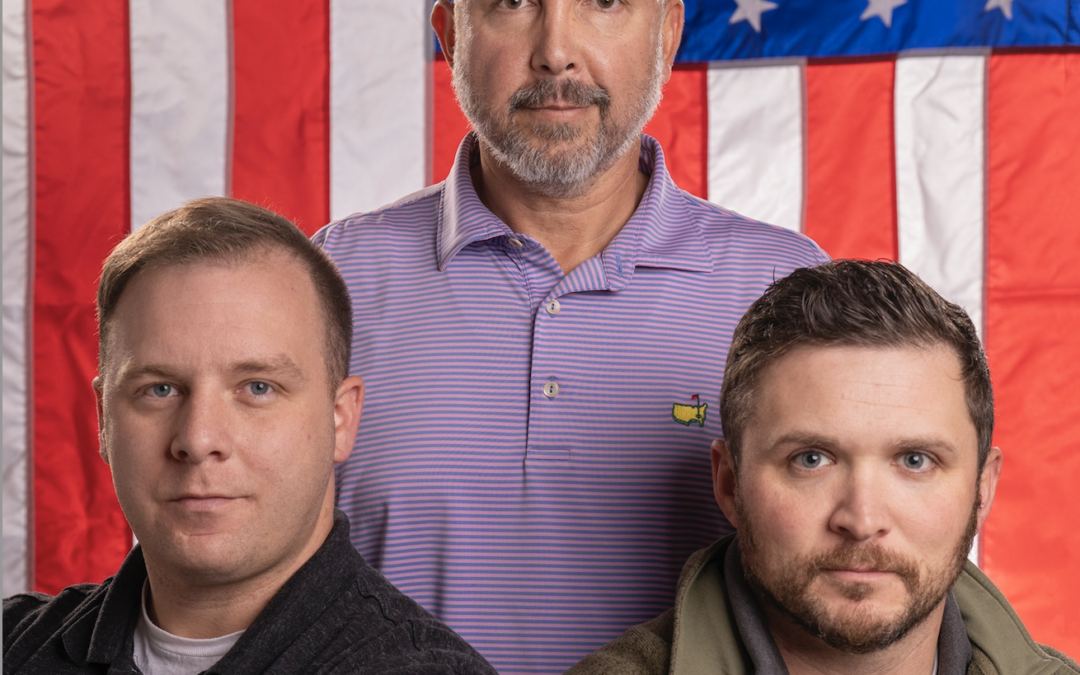Two-year-old Webb Waddell has gone through more in his short life than most people experience in their entire lives.
After months of trying to figure out what was wrong, at seven months old, it was discovered that Webb had a pilomyxoid astrocytoma brain tumor. His parents, Scott and Laura Waddell, noticed something was wrong from the very beginning, Laura said. He had difficulty eating, and around six weeks old he was taken to an urgent visit with his pediatrician. They changed his formula, but his eating issues didn’t get better. At four months, he was taken to the emergency room after prompting from his G.I. specialists.
“He had not taken in enough fluid for the day, and the fear was that he was being dehydrated, and so that landed us with our first hospital stay in October 2021,” she said. “We were there for six days at Children’s Hospital. We left with an NG tube, a nasal gastric tube, a feeding tube to help get him hydrated and the nutrition he needs.”
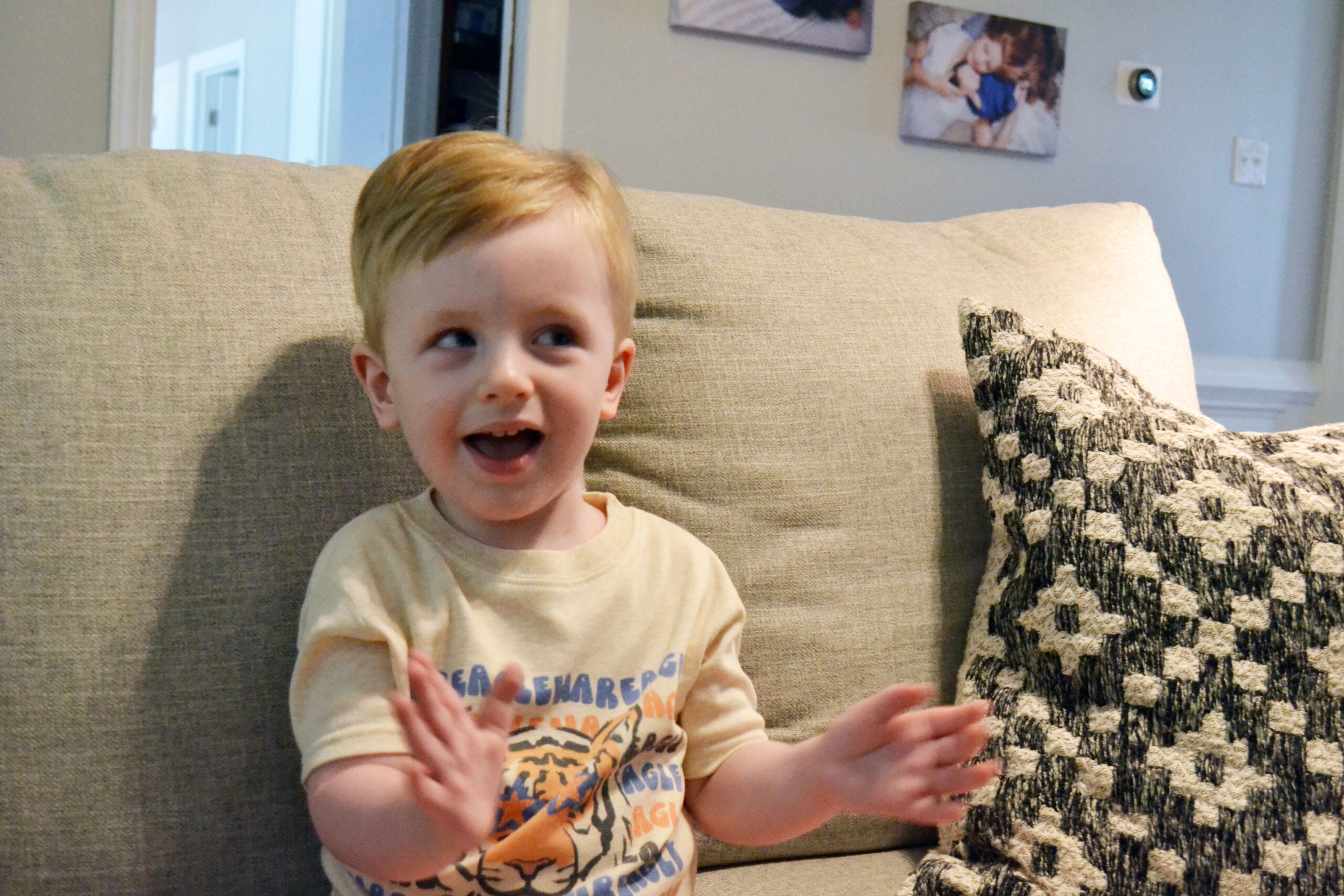
On Saturday, Feb. 5, 2022, Laura had just gotten Webb up from a nap and noticed his right eye was moving back and forth. It was too late in the day to get him to the pediatrician and after-hours care was over for the day, so that Sunday, she took him to the doctor and was immediately referred to the Children’s Hospital of Georgia neurology.
They saw Dr. Suzanne Strickland, who was concerned because what was happening was only happening in one eye, Waddell said. An urgent MRI was ordered and done two days later on Thursday, Feb. 10.
“That Thursday, we had his MRI, and they found his tumor, which was the size of a plum in his brain, and we were promptly admitted at that point,” Waddell said. “That’s when it started. That’s when everything, at least at that point we had an answer for what it was. We weren’t playing this guess gaming, because by the time we were in the hospital at four months, and we left with the NG tube. They had run every test under the sun, there was no bloodwork abnormality, an upper GI, a lower GI, they had done an ultrasound of his head, they had done everything and couldn’t find anything. Scott was like something is still not right. So, it wasn’t until at seven months old that we finally found out.”
Diagnosis
The tumor was a pilomyxoid astrocytoma brain tumor or an optic pathway glioma, she said. The tumor extends from his optic pathway from the nerves that connect to his eyes and caused the eye to move back and forth because it was pressing on the nerve.
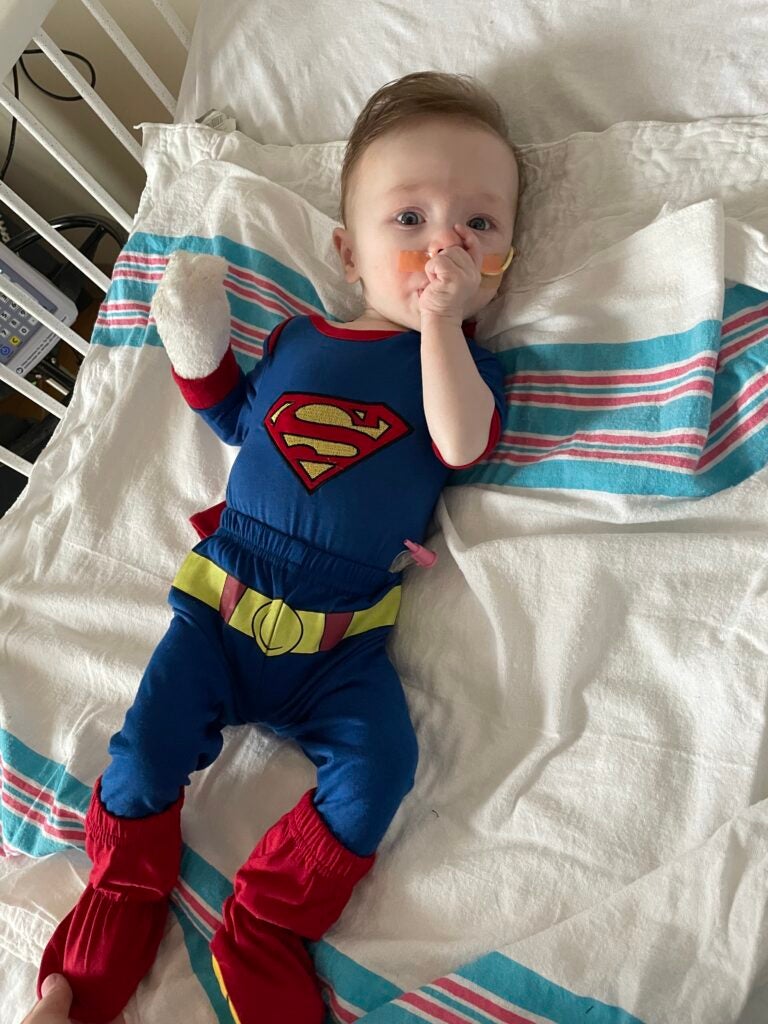
“Thankfully it is considered low grade,” Laura said. “It’s not an aggressive cancer in that it does not rapidly metastasis to affect surrounding tissue. But, it has an extremely high rate of reoccurrence which is why we have to monitor him so closely.”
After his diagnosis, Laura said things happened very quickly and did not follow the normal course of what was expected. It was a Thursday when they located and identified the tumor, and following the diagnosis they spent the next few hours meeting with doctors and specialists. A brain surgery was scheduled for that Monday, and the doctors thought it was a certain type of tumor that they could resect or take out the entire thing. However, that’s not what ended up happening.
“We had to be there Friday and all weekend, and Monday morning was going to be the surgery, until Friday,” Laura said. “…Webb woke up crying, I was sleeping in a chair beside his crib in the hospital. He woke up with the most guttural cry I think I have ever heard, and he was having a stroke. His tumor had got so large that it bled. It bled within itself and caused a brain bleed and half of his face, he was having a stroke. He looked like a traditional stroke victim where half the face is drooping, and it was the scariest thing I’ve ever witnessed.”
Laura said she frantically searched for the panic nurse button and then suddenly 20 nurses rushed into the room. They were taken down to the pediatric intensive care unit (PICU), where they stayed until Webb could have emergency brain surgery that Friday.
“What the doctor had initially planned to do he could not do because of the brain bleed, because of the way his tumor bled,” Laura said. “[The doctor] described it as a messy operating field, he could not distinguish healthy tissue from tumor tissue as well as he wanted to have. So, he wasn’t able to resect everything. That, coupled with where his tumor is located, I said it was the optic pathway so we’re talking about very delicate nerves. It’s also right next to his pituitary gland, his adrenal gland, and that part, it’s called the optic chiasm, which means there’s a space where all these delicate structures just kind of sit that regulate every bodily function you can think of, including things like urine output, so he had to be very, very careful.”
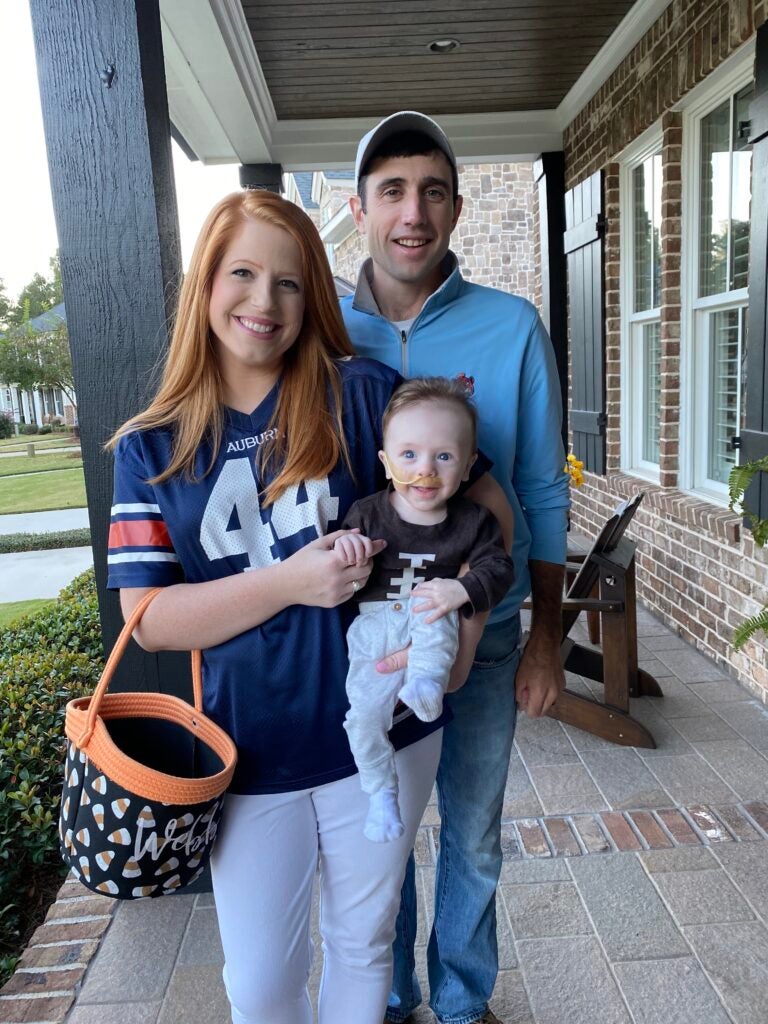
She said that Dr. Khoi Nguyen, who did the operation, is “an exceptional surgeon” who “saved Webb’s life.” Waddell said he took out or resected what he could of the tumor and cut off its blood supply so it wouldn’t be able to grow any larger based on what he could see.
“It basically wasn’t being, for lack of a better term, fed by his circulatory system anymore. He killed it, he was trying to kill it,” said Waddell.
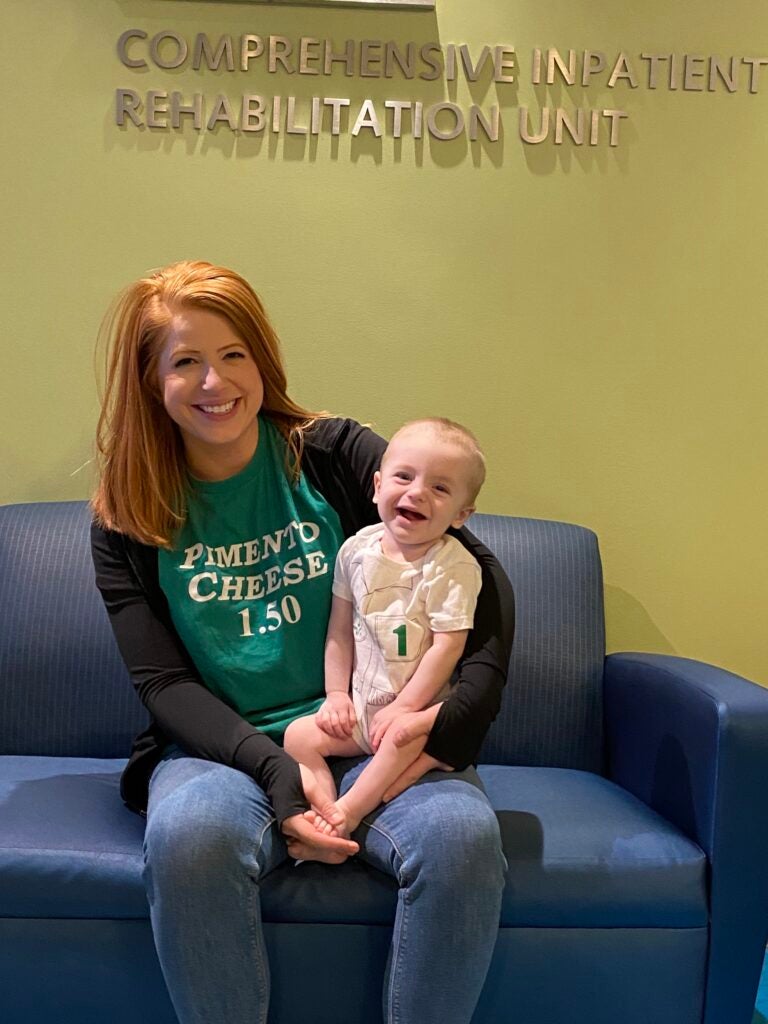
Treatment following surgery
Following his emergency brain surgery, Webb spent six weeks in the CHOG PICU recovering from the surgery. During those six weeks, he had several emergency CT scans and MRI scans. At one point, they thought he was having another seizure or brain bleed, and while rushing him down for a scan, his oxygen levels dropped, and he was bagged in the hallway.
Webb was finally able to move to a floor for cancer patients before being transferred to the Children’s Healthcare of Atlanta Scottish Rite campus. There, they spent two weeks in the critical inpatient rehab unit. While there he received different types of therapy, including PT, occupational, speech and music – and it was helping.
“At that point he started taking a bottle again,” Waddell said. “We were like, OK, this is good. He can eat and we can get rid of some of that stress, which was fantastic.”
The chemotherapy was started in Atlanta, and Waddell said they could see improvements in Webb. He was able to eat, starting sit up, he was getting better. They came home the Tuesday of Masters Week 2022 and continued the chemo treatment here in Augusta.
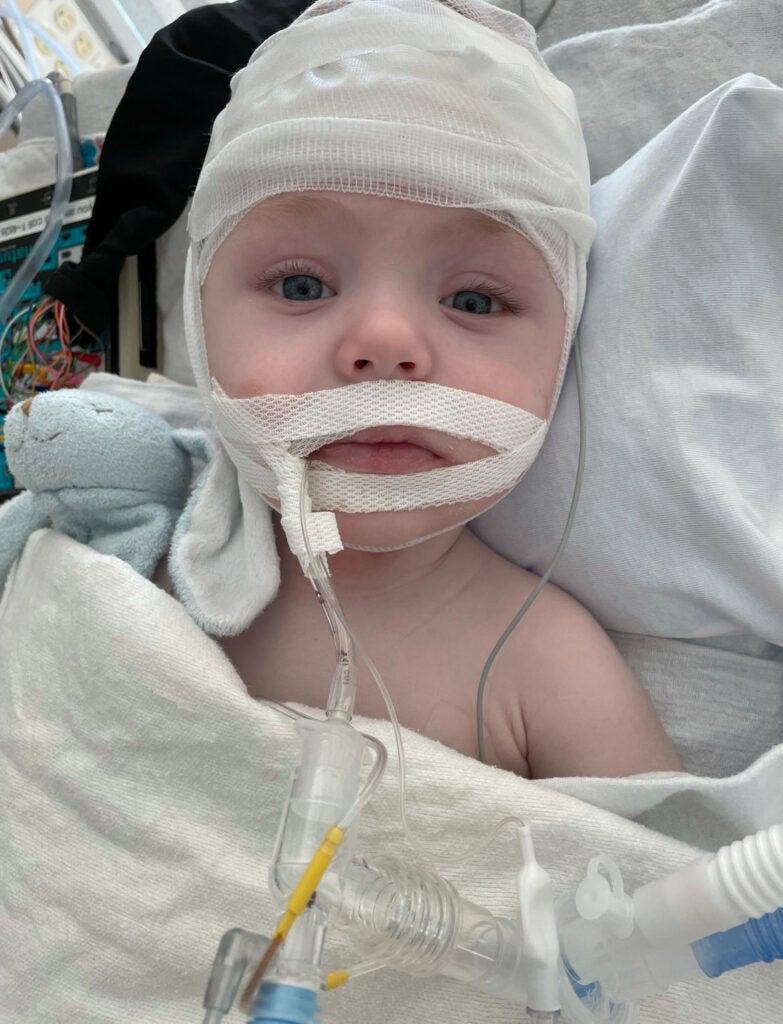
After treatment
After 14 months of chemo, Webb was able to celebrate his last treatment on June 6, 2023. The end of his chemo came on D-Day, which she said was fitting for their family.
“Webb was named for my grandfather, who was a World War II veteran who fought at D-Day and for his infusion to end on the anniversary of D-Day, it was kind of fitting and really, really cool,” Waddell said. “We faced delays and hurdles and things that caused pauses in treatment along the way, so to actually reach a finish line like that, it was incredible.”
The treatment wasn’t always easy, and Webb had to stay in the hospital a couple of times, but he made it through everything. Now he must get scans quarterly for the next two years, and in fact he goes to his next one on Sept. 1, which Waddell said was fitting because it was the start of Childhood Cancer Awareness Month. At that scan, he will be getting a full brain and spine MRI. He needs a scan of his spine because when his tumor was located, they found some legions on his spine as well.
“The cells that make up your brain are also found in your spinal cord…it’s all the neurosystem,” Waddell said. “So, the same cancer cells that were in his brain were also kind of donated along the vertebra of his spine through the spinal cord, so they check that, not every MRI, it’s every other MRI. Thankfully with his treatment, those spinal legions have all but disappeared, just one small, very inconspicuous spot, I think that was the wording.”
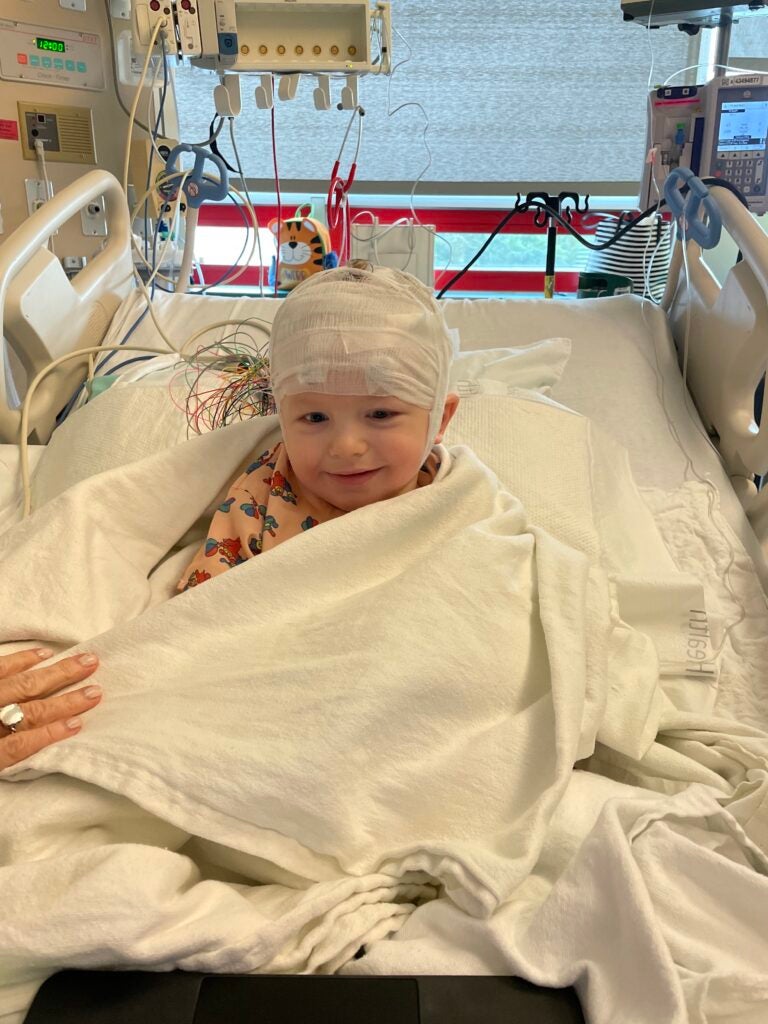
Following his treatment, Waddell said it’s been amazing to see the progress Webb has made, and it’s like seeing a whole new child.
“Now that he’s done with chemo, we weren’t really sure what Webb’s capabilities were because he was sick essentially from the moment of birth,” Waddell said. “The doctors said he was born with his tumor and just progressively got worse until his actual diagnosis at seven months. So, we haven’t really been able to see what he’s capable of until recently.”
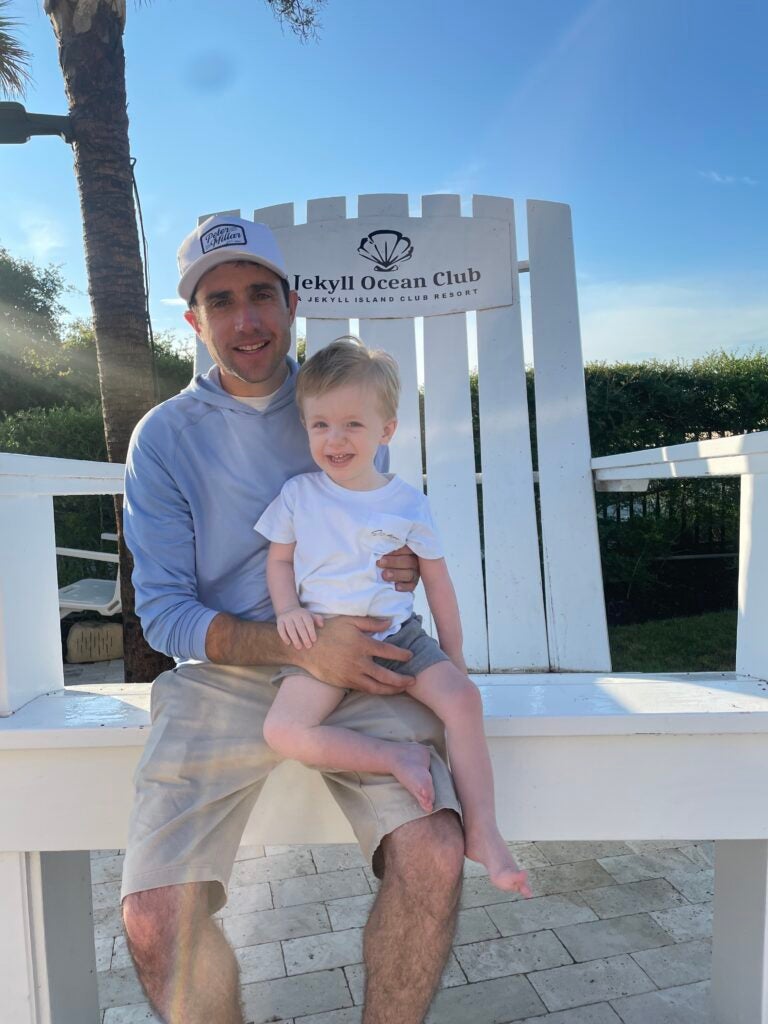
What they’re thankful for
Waddell said since he finished chemo, Webb has had an increase in energy, appetite, strength and attentiveness. She added that he’s playing with toys he never noticed before because the tumor could’ve caused some permanent damage to his visual impact.
“He loves you to sing songs to him, loves to sit and be engaged with and he is, without exaggeration a brand-new baby,” Waddell said. “He’s a brand new two-year-old who has a completely new lease on life.”
Waddell said they are very lucky because not every family sees the success that Webb did with his tumor. After chemo cycle, they saw a reduction in the tumor, which responded to the chemo better than expected.
“When we went to Atlanta with his last follow up with his neurosurgeon, she said we would consider this a better than normal response,” Waddell said. “And not every family gets to experience that, and that’s not lost on me.”
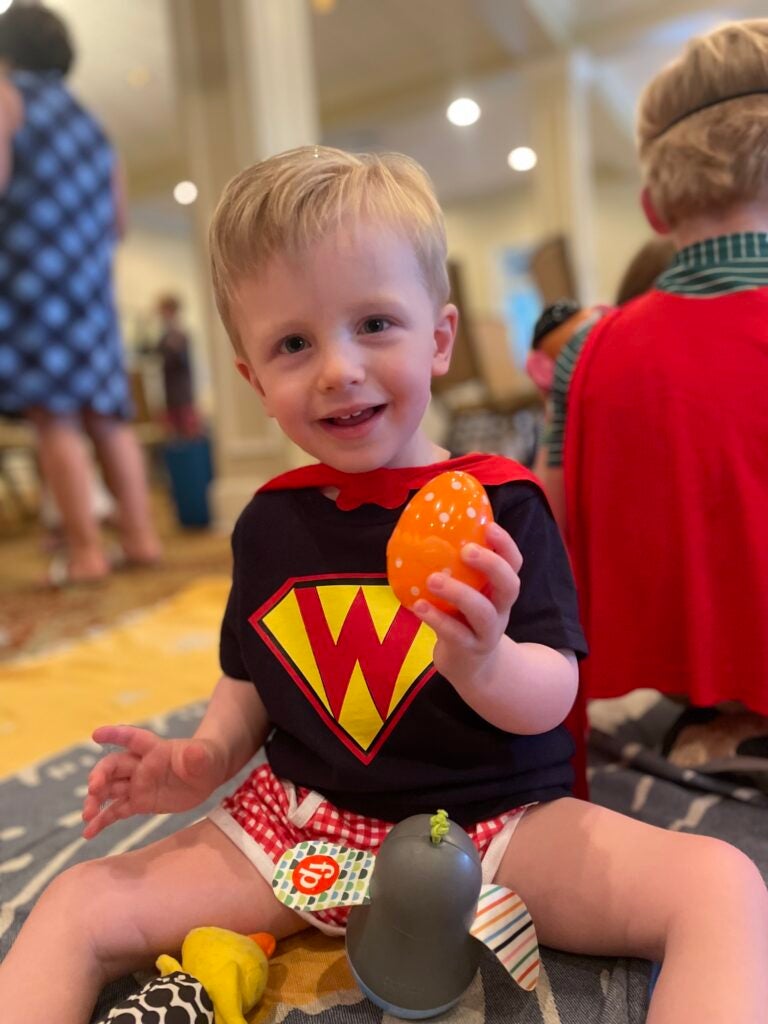
She said when she sees Webb doing something new, such as scooting around on the floor or playing with his toys, those are big accomplishments because he didn’t do that before. Waddell added that the things taken for granted she doesn’t take for granted anymore.
“I have learned to celebrate the milestones that I did not know could be milestones, small victories because those small victories are not small when your future is questionable,” Waddell said. “There’s nothing, with him everything seems like a miracle because it wasn’t supposed to be that way. When we were told what we were facing, we were told he was potentially going to be blind, we were told throughout chemo he was going to lose his hair, we were told his tumor wasn’t going to shrink, these tumors don’t shrink we were told. So, we were dealing with a really, really grim future that’s not our reality and for that we are really thankful.”
Getting through everything
As for what helped their family get through everything, Waddell said it was her family, friends, work family at Grovetown High School and their faith. She said Scott, her husband, was a rock throughout everything, her parents were with them every step of the way and her in-laws came down from Canada and stayed with them.
“Having my faith, which was tested a lot, was very, very integral in kind of helping staying positive throughout all of the really, really dark times,” Waddell said. “There were several days I would sit there and not know what the next day was going to look like, not know how we were going to get out of it. Especially after getting a questionable pathology report in the beginning and thinking we were maybe dealing with a grade 4 tumor that was highly malign, highly aggressive, and I might not be taking my baby home because that was the reality of that conversation initially after we had that talk about the early pathology findings.”
Advice for others
As for any words of advice she would have for parents going through something similar, Waddell said there are a few things. One is to be persistent because the parents are the voice of their children, especially when they can’t speak up for themselves, and they know their children best. It’s also important to be as educated as possible about what your child is going through.
“I’m a high school history teacher. I don’t have a medical background, but I will tell you I learned fast,” Waddell said. “I knew that any time a doctor stepped in my room and was talking to the nurses in my room with him, I wanted to know exactly what they were saying and what it meant. I wanted to know what every acronym was that they were using, and I didn’t want to have to pester my nurses…I kept a notebook… of the six weeks when we were in pediatric intensive care. Every time the doctors would make rounds, I stood at the door with them, and I took notes. Then I would go to my iPad and say (what does this mean).”
Waddell also encouraged people to find a community of people who have gone through something similar, and social media is great for that. During this time, she created a Facebook page to get the information out to everyone in a central spot. Once they found out Webb had cancer, the page became a way to connect with other families and success stories of people who have gone through the same thing.
“I think that having 1,200 to 1,300 people that are so closely wanting to follow his story because it’s inspiring and successful is, it says everything,” Waddell said.
To stay up to date on Webb’s journey, visit the Team Webb Facebook page.
Stephanie Hill is the managing editor and covers Columbia County government for The Augusta Press. Reach her at stephanie@theaugustapress.com.

